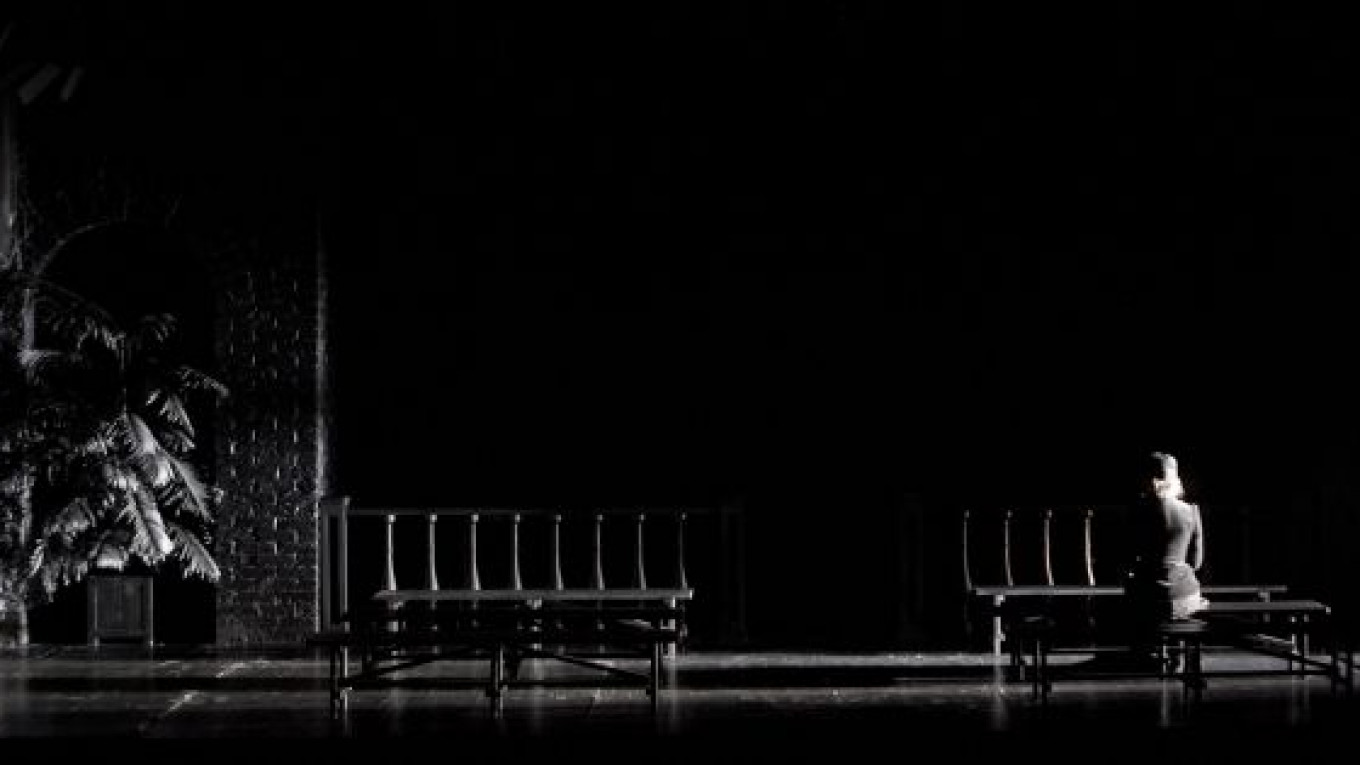Sergei Zhenovach does not stray far from his core interests in search of material. Ever since his Studio of Theater Art was established in 2005, he has hovered closely to the classics. More specifically, he has repeatedly come back to the Russian classics of the 19th century.
The theater got its start with a student production called “The Boys,” based on nine chapters from Fyodor Dostoevsky’s novel “The Brothers Karamazov.” It became a hit with Moscow’s student crowd and made it possible for Zhenovach to organize his graduating class at the Russian Academy of Theater Arts as a professional troupe.
Now, after six years during which he has staged works by Anton Chekhov, Nikolai Gogol, Nikolai Leskov and Charles Dickens, among others, Zhenovach has returned to the beginning. His latest production, “Brother Ivan Fyodorovich,” is another rendition of a segment of “The Brothers Karamazov.”
Zhenovach has evolved a style that puts a premium on spoken dialogue and usually eschews theatricality. He often places his actors in seated or standing positions, from which they deliver monologues or engage in conversations. Whatever “happens” in a Zhenovach production tends to reach us through words and not action.
At its best — as in the award-winning production of Andrei Platonov’s “The Potudan River” — this approach is capable of revealing rich nuances in the psychology and makeup of characters.
At its weakest it can descend into a kind of radio theater.
“Brother Ivan Fyodorovich” struck me as an example of Zhenovach digging as deep into radio as he possibly could.
The production shows several characters of Dostoevsky’s novel at one of its most crucial turning points — the period shortly before Dmitry Karamazov is to be sentenced on charges of murdering his father. Along with the “profligate” Mitya, we see his brothers, the intellectual Ivan and the pious Alyosha; their half-brother, the mysterious and sick Smerdyakov; as well as several women who are entangled with the Karamazov men — Liza, Grushenka and Katerina Ivanovna.
I find it hard to pinpoint what Zhenovach was up to in this work. In scene after scene, two characters — or very rarely, three — sit on benches and talk. I am even unclear as to why Ivan was chosen title character. It seems an arbitrary and confusing move.
Yes, Ivan’s perhaps imaginary relationship with a devil figure is central to the whole Karamazov problem — a family cursed always to live on the slippery cusp between evil and good. But Mitya is the embodiment of this problem and the focal point of almost every conversation, while Alyosha is the living antidote to the problem and is present more than anyone else in the performance.
All begins as Mitya’s lover Grushenka (Maria Shashlova) opens her heart to Alyosha (Alexander Proshin), bemoaning the way in which jealously warps love. This nicely acted scene has the feel of a good prologue, something that whets our appetite with a bit of humor and a lot of conflict.
Nothing develops from there on, however. Every subsequent scene is, in essence, a repeat of the first. The topics change, but the form never does. All literally sit and blather: Smerdyakov (Sergei Abroskin) accuses Ivan (Igor Lizengevich) of being the murderer because the idea was his; Mitya (Alexander Oblasov) doesn’t care what happens to him because he now believes it is his duty to incur punishment; Liza (Maria Kurdenevich) “loves evil” obviously without understanding what that means.
In the absence of a theatrical presentation, we got nothing more from these dialogues, and perhaps much less, than if we were just to hold the book and read it. I say “less” because almost all the characters are stripped of Dostoevsky’s harsh, pungent qualities. Everyone, including Smerdyakov and Ivan, is mild-mannered and loathe to offend. This is anything but “Dostoevskian.”
The key exception, and, thus, the catalyst of this production’s most effective scene, is Kurdenevich as the tastefully overwrought Liza. She is quirky, funny and a joy to watch as she frustrates the colorless Alyosha no end.
Designer Alexander Borovsky did not give the actors much room to move. The performance space consists of several rows of benches before a courthouse railing. All is in various shades of black, including the space beyond the railing, the costumes and the benches themselves. It is one of the most unchanging and claustrophobic theatrical spaces imaginable.
Ultimately, “Brother Ivan Fyodorovich” understates Dostoevsky so much as to lose contact with the source altogether.
“Brother Ivan Fyodorovich” (Brat Ivan Fyodorovich) plays Tuesday, Wednesday and June 29 at 7 p.m. at the Studio of Theater Art, located at 21 Ulitsa Stanislavskogo, Bldg. 7. Metro Taganskaya. Tel. 646-7459, . Running time: 2 hours, 30 minutes.
A Message from The Moscow Times:
Dear readers,
We are facing unprecedented challenges. Russia's Prosecutor General's Office has designated The Moscow Times as an "undesirable" organization, criminalizing our work and putting our staff at risk of prosecution. This follows our earlier unjust labeling as a "foreign agent."
These actions are direct attempts to silence independent journalism in Russia. The authorities claim our work "discredits the decisions of the Russian leadership." We see things differently: we strive to provide accurate, unbiased reporting on Russia.
We, the journalists of The Moscow Times, refuse to be silenced. But to continue our work, we need your help.
Your support, no matter how small, makes a world of difference. If you can, please support us monthly starting from just $2. It's quick to set up, and every contribution makes a significant impact.
By supporting The Moscow Times, you're defending open, independent journalism in the face of repression. Thank you for standing with us.
Remind me later.







